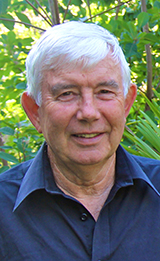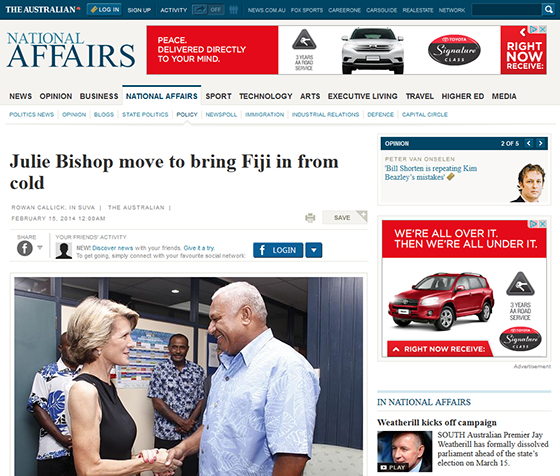David Robie also blogs at Cafe Pacific
THE AUSTRALIAN yesterday featured an “historic come-in-from-the-cold” meeting in Suva between Foreign Minister Julie Bishop with Fiji military-backed regime chief Voreqe Bainimarama in a report by Asia-Pacific affairs editor Rowan Callick.
She revealed to Bainimarama that the past 56 requests for exemptions under the relaxed travel sanctions policy had been granted (except for one on a technicality), with Callick summing up the “warm” meeting like this:
In the Coalition’s most decisive step away from the foreign policy position of the Rudd-Gillard years, it is restoring links with Fiji across the whole of government, including, crucially, defence ties.
Ms Bishop’s meeting with Commodore Bainimarama went for an hour, running overtime.
According to Callick’s report, Fiji’s Foreign Minister, Ratu Inoke Kubuobola, has been “to Australia often, and the government’s second most powerful figure, the Attorney-General, Aiyaz Sayed-Khaiyum, was allowed to travel to Australia over Christmas”. Callick wrote:
The last meeting between Commodore Bainimarama and an Australian Foreign Minister, Labor’s Stephen Smith, degenerated into recriminations. The most recent meeting with New Zealand Foreign Minister Murray McCully was also difficult.
Rowan Callick has been a valued occasional contributor to Pacific Scoop, and another contributor, academic Dr Scott MacWilliam, a long time resident of Fiji based at the University of the South Pacific as an associate professor but now at the Australian National University, points out that the punitive “sanctions” Canberra policy towards the Bainimarama regime in 2006 was actually introduced by the previous John Howard-led Coalition government – not by Labor.
Dr MacWilliam says the Tony Abbott-led Coalition now “wants desperately … for Fiji to assist with its ‘Pacific Solution’.
“By using whatever influence PM Bainimarama has in the Melanesian Spearhead Group, the Australian government hopes that he will assist in finding more countries which will open refugee camps. Fiji too is on the radar as a settlement target.”
Dr MacWilliam, whose article on the “Pacific Solution” and Fiji was published on Pacific Scoop yesterday, writes in a note to Café Pacific today:
-

Dr Scott MacWilliam … Fiji on the radar for “Pacific Solution”. Image: PMC The meeting of Fiji’s Prime Minister Frank Bainimarama and Australian Foreign Minister Julie Bishop was indeed historic but not for the reasons outlined in the Australian media, where the occasion was a lead news item in the press, radio and TV.
- Even Rowan Callick of The Australian missed the significance of the meeting in his story which accompanied a front page picture of the two shaking hands in Suva. Callick wrote that this was important because it represented “a step away from the foreign policy position of the Rudd-Gillard years”.
- But sanctions, the cornerstone of the Australian stance toward the military regime, were imposed immediately after the 2006 coup by Alexander Downer, the Foreign Minister in the John Howard-led conservative coalition. The Kevin Rudd and Julia Gillard–led Labor dominated coalition simply adopted the policy which was in place after winning the 2007 election in Australia.
- There was some softening in the Australian position after 2006, mainly in the form of increased aid granted at the same time as the World Bank and Asian Development Bank were persuaded to cut their support for Fiji. However the sanctions policy which has lasted until recently is better described as the Howard-Rudd-Gillard policy. Not for the first time, the Abbott government is distancing itself from its conservative predecessor.
- Although the Fiji government will be well aware of this correct history, it will also know the underlying reason for the rapprochement being sought by the current Australian government. What the Tony Abbott-led coalition wants desperately is for Fiji to assist with its “Pacific Solution”. By using whatever influence PM Bainimarama has in the Melanesian Spearhead Group, the Australian government hopes that he will assist in finding more countries which will open refugee camps. Fiji too is on the radar as a settlement target.
- Any other assistance the Fiji government can provide in getting Australia, New Zealand and the USA an improved strategic and commercial position in the region will of course be welcome too.






“Dr MacWilliam says the Tony Abbott-led Coalition now “wants desperately … for Fiji to assist with its ‘Pacific Solution’.”
Yes, that must be the logical conclusion, but the new Australian government may also want to get Fiji back “into the fold” so to say, as Mainland China and Fiji have over recent years got rather warm and friendly in their relationship.
There are “pragmatic” and strategic self interest motivations behind this move and new conduct of the new Australian government towards the Fiji regime, and I would not rule out that a deal is anticipated, to use Fiji to house another camp for asylum seekers and unwanted migrants, as the ones used on Nauru and also in PNG.
The Tony Abbott government does not follow principles, as is seen also in the now very damaged relationship with Indonesia. Abbott is like a rhino in a china-shop, it seems, a danger for stability, I dare to say.
Bishop was also the one who raised the idea of charging Greenpeace activists who were arrested by Russian forces at their Arctic oil drilling protests, and then kept in prison for months. She wants to charge Australians that cost the taxpayer too much, especially when they take risks like “daring” to protest in other countries or their areas of interest.
There are other moves happening inside Australia that give reason for great concern. Abbott gave John Key the fob off treatment re the New Zealand products taken off supermarket shelves and other matters, and they now also seem to be wanting to slash their welfare spending, going possibly further than what this rotten NatACT government here in New Zealand has dared to do.
In international relations we can expect Abbott to be very, very cosy with the US. But he risks causing tensions with more East Asian countries, which will not serve the medium to long term interest of the whole region here.
Who would have thought that the freedom loving Australians would embrace a dictator in the south pacific. Thanks for the blog Dr David – rather enjoyed.
Comments are closed.